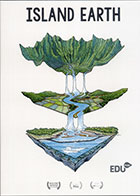
Island Earth 2017
Distributed by Tugg, Inc., 855-321-8844
Produced by Cyrus Sutton
Directed by Cyrus Sutton
DVD, color, 63 min.
General Adult
Environmentalism, Agribusiness, Hawaii, Politics, Capitalism, GMOs
Date Entered: 06/04/2018
Reviewed by Andrew Jenks, California State University, Long BeachThe Malthusian view that humanity is procreating and consuming itself into oblivion has been a staple of the environmental movement. In confronting the Malthusian dilemma – which suggests that the human consumption of resources advances far faster than the increase in resources -- activists and policy-makers have proposed two different approaches. One involves a technological fix (solar power, recycling, or nuclear power, for example) that will solve the problem of resource constraints without having to change consumption patterns. Another is to look toward more traditional practices and traditions that aim to limit consumption, promote environmental awareness, and seek sustainable methods of production with limited carbon footprints. This documentary examines the interplay and tensions between these two approaches on the islands of Hawaii, whose colonial legacy – the transformation of Hawaii into a tourist mecca and a branch of agribusiness -- has intensified debates about the proper approach to economic development.
Bounded and limited by surrounding waters, islands reflect in microcosm the larger global forces at play. This is especially true of Hawaii, where the clash between the chemically-intensive method of large-scale farming and smaller-scale traditional farming are concentrated in small areas. It was the Europeans who brought new attitudes toward resource exploitation. They brought with them diseases that wiped out 90 percent of the native population and then replaced Hawaiian agriculture with sugar, coffee and pineapple plantations. Those large-scale enterprises were linked to global markets rather than local consumption – causing a break between the land and culture, and between tradition and modernity, so typical of modern societies. How to reestablish these connections between the land and culture, while remaining integrated and connected to a global nexus of economic and industrial processes, is the dilemma facing Hawaii and the larger subject of this stimulating documentary. The great strength of Island Earth is to provide a variety of local views on the environmental challenges in Hawaii, and to shy away from the presentation of simplistic solutions.
Rather than setting technology and tradition against each other, some of the subjects of the documentary have converted to the cause of genetically modified organisms (GMOs), hoping to seize the latest technological and scientific instruments of the European and mainland settlers and direct them toward a Hawaiian destiny. Because Hawaii has three growing seasons, it has three seasons of pesticide application in one year, transforming Hawaiian large-scale agriculture into a particularly lethal enterprise. Pesticides have penetrated bodies, causing cancers and all manner of illnesses, with the conscious collaboration of regulatory authorities and agribusiness, who are well aware, like the tobacco companies previously, that their products kill. The challenge, for the GMO advocates, is to separate GMO in the public mind, and in agricultural practice, from the use of pesticides and chemical fertilizers. Potentially, at least according to its advocates, crops can be engineered to be resistant to pests, thus obviating the need for pesticides.
But not all Hawaiians embrace the biotechnological fixes, and those who do support them face hostility and charges of betrayal. Perhaps, as the subjects of this interview suggest, tradition and bioengineering, at least as currently practiced, may be mutually exclusive. Many of the protagonists of the film who entered science with the goal of making Hawaii more self-reliant and less environmentally destructive have become disillusioned from their encounter with the power structure that controls Hawaii, which still lives, in the words of one interviewee, under the long shadow of the plantation system created by Europeans two centuries previously.